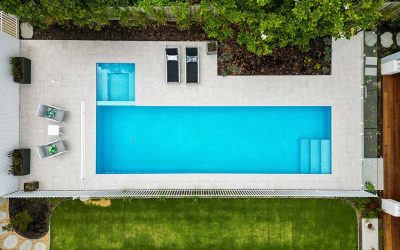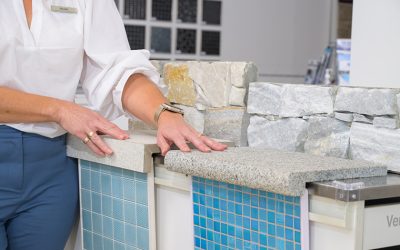STONE TILE CARE
There are many ways you can maximise the longevity of natural stone.
Swimming pool water contains powerful chemical reagents and when they contact natural stone tiles or coping it requires special attention and consideration.
- Natural stone should be sealed following installation with the appropriate sealer. All exposed surfaces, including the underside of the coping that hangs over the edge of the pool must have adequate sealer applied, which varies depending on porosity of the stone. All surrounding stone should be grouted. To protect your investment, it is recommended that resealing occurs every 2-3 years to mitigate the water ingress into the stone. Professional approved sealing applicators follow key guidelines to ensure that the stone is correctly cleaned and sealed that may facilitate longer intervals between resealing. Resealing is required when the stone allows water to rapidly penetrate, giving a wet darkened look. Most penetrating sealers are semi breathable thus some water ingress does occur over time, however the water penetration is greatly reduced. See below for more information about sealing your stone pool pavers.
Also DIY stone sealing - It is recommended that pool owners keep the water level 75mm below the pool’s coping. If your water is too close to your natural stone, the salt can be drawn into the stone via a process called wicking which can cause damage to the stone and tile adhesive. Salt will detrimentally impact all sealer resins allowing water ingress into the stone. If you observe the pool coping appearing damp due to a high water level, then immediately lower the water level to prevent water wicking into the stone and potentially causing damage.N.B. If you are considering a “Grande” style natural stone coping, you should mention this to your pool builder in case he needs to revise the height of the skimmer box to enable the water level to be kept 100mm below the coping. This does not apply to porcelain tiles which, given their negligible porosity, are immune to salt attack. * It also does not apply to fibreglass pools because the fibreglass pool walls are not porous.
- Remove staining matter quickly before it penetrates into the stone. Sealing does not make Natural Stone ‘stain proof’ but it gives a window of opportunity to remove the stain and facilitate easier cleaning of the stone. If stone is not sealed some regular household stains may be difficult or impossible to remove.
- Use a pH neutral cleaner for regular cleaning and maintenance for the stone. Avoid using acids or strong alkali products to clean as these will reduce the effectiveness of the sealer and may damage the stone.
- It should never be necessary to Gerni or pressure wash the stone.
- Hose the stone down with fresh water (mains pressure only) after every session.
DON’T USE HYDROCHLORIC ACID TO CLEAN STONE
Important note and Disclaimer
Following or during installation, do not try to clean natural stone tiles with Hydrochloric Acid HCl (also sometimes known as muriatic acid).
Natural stone will absorb hydrochloric acid and you will run the risk of permanently affecting the colour tonality which could lead to permanent fading or staining of the stone tile or paver or coping.
To remove any excess dirt or grout after laying, we recommend only the use of detergent, water and a sponge or non-abrasive brush.
Disclaimer
Should the use of Hydrochloric Acid be evident during any inspection subject to a claim, The Pool Tile Company will reject the claim immediately on the basis of your receipt and acceptance of this notice and its instructions.
Download our Safety Data Sheet (PDF) here.
SEALING STONE TILE AND PAVERS
Cleaning and sealing your paving stone is important.
The Pool Tile Company recommends that all natural stone paving tiles be sealed as soon as the stone is sufficiently cleaned and left to dry after being laid. If you are laying sandstone or Dune limestone or Noosa Shore limestone around a salt water pool, the coping tiles should be dip-sealed with a consolidator before laying. This is not a sealer, it hardens the stone and protects it from salt attack. After laying a compatible penetrating sealer can be applied.
DIY STONE SEALING
If you would like to do the cleaning and sealing yourself, see product information from three of the best available stone tile cleaning and sealing products (below).
Lithofin
Stain-Proof® previously known as Dry-Treat™. Phone: 1800 675 119
Solution Sealers Phone: 1300 478 663
RECOMMENDED STONE SEALING PROFESSIONALS
Below is a list of stone tile cleaning and sealing businesses that The Pool Tile Company recommends.
South East Queensland
Company: Stone Clean & Seal
Service area: Ballina, Byron Bay, Gold Coast, Brisbane, Toowoomba, Sunshine Coast
Contact: John Tindale (0400 828 785)
Sole Trader: Damien Alig
Service area: Gold Coast, Brisbane, Ipswich, Toowoomba, Sunshine Coast
Contact: Damien Alig (0408 108 407)
Company: Stone Sealing Solutions Pty Ltd
Contact: Daniel Nash (0466 974 416)
Sydney
Company: Northeast Sealers
Service area: Sydney Metro
Contact: Mark Baker (0433 399 967)
Customers outside of this area can consult the sealing product manufacturer who should be able to give details of accredited applicators in your area.
Using a professional stone cleaning and sealing company enables you to receive a warranty on the completed work. The length of the warranty will vary depending on the product used.





